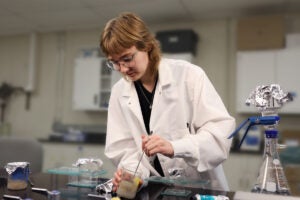Dr. John DiGiovanni, an internationally known cancer researcher who studies the link between obesity and cancer, has joined the pharmacy and nutritional sciences faculty at The University of Texas at Austin.
DiGiovanni will hold the Coulter R. Sublett Chair in the College of Pharmacy. He has a joint appointment in the College of Pharmacy’s Division of Pharmacology and Toxicology and the Department of Nutritional Sciences in the College of Natural Sciences.
Most recently, DiGiovanni was a professor in the Department of Carcinogenesis (carcinogenesis is the process of cancer development) at the University of Texas M.D. Anderson Science Park Cancer Research Center in Smithville.
DiGiovanni’s research lab will be at the new Dell Pediatric Research Institute (DPRI) adjacent to Dell Children’s Hospital. Dr. Stephen Hursting, professor and chairman of the Department of Nutritional Sciences and a long-time collaborator of DiGiovanni, will be among the pharmacy and nutrition faculty moving to the DPRI. A major part of their research will deal with how obesity affects health, particularly chronic diseases such as cancer and diabetes.
Dedication of the DPRI is scheduled for April 23. Researchers from molecular biology, neuroscience and genetics with additional focus areas in cancer, neurogenetics, drug development and birth defects eventually will work at the DPRI.
“John DiGiovanni is one of the preeminent researchers in oncology, and we are delighted to welcome him to our faculty,” said Dr. Lynn Crismon, dean of the College of Pharmacy. “His research is complementary to that of many of our current faculty members, and I am excited to consider the investigative collaborations that will, no doubt, develop.”
Much of DiGiovanni’s past research has focused on understanding the molecular and cellular mechanisms associated with cancer development. A major new research direction focuses on the impact of obesity on cancer development and progression, including obesity that occurs early in life.
“Obesity in children has risen dramatically in recent years,” DiGiovanni said. “Obesity in both adults and children increases risk of cancer development as well as severity of the disease for a number of important cancers. However, the mechanisms that underlie the effects of obesity on cancer development and progression are not well understood.
“Our research aims to address these mechanisms and to identify molecular targets and strategies to offset the increased cancer risk and mortality associated with obesity.”
Cancer is the second leading cause of death in Texas and the nation, DiGiovanni said. There is no single known cause or cure for cancer.
“Behavioral and lifestyle factors are the leading causes of cancer mortality in the United States,” DiGiovanni said. “The human and economic toll from illness and untimely death resulting from cancer is enormous, thereby making present-day prevention efforts all the more imperative.
“Despite the remarkable treatment advances in the past several decades, cancer remains the leading cause of death by disease in children between the ages of one and 14 years.”
DiGiovanni said the growing epidemic of childhood obesity is alarming. Over the past 25 years, the number of Texas children and adolescents who are overweight or obese has more than quadrupled, with nearly 25 percent of elementary, middle school and high school students overweight, and another 20 percent at high risk of becoming overweight, he said.
“This epidemic is occurring in both boys and girls, across all socioeconomic lines and among all racial and ethnic groups,” DiGiovanni said. “Approximately 75 percent of overweight children will be obese adults. Thus, it is extremely important to develop effective strategies for preventing obesity and obesity-related diseases in children and young adults.”



